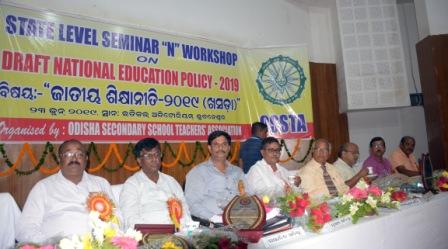Bhubaneswar: The OSSTA (Odisha Secondary School Teachers Association) has called for more time to extensively debate the Draft National Education Policy, 2019.
The teachers’ collective organised a state level seminar and workshop on the draft policy.
The event was inaugurated and attended by Samir Das, Minister of State, School and Mass Education.
The teachers association has asked for an extension of the June 30 deadline, which is the last date of submission of the state governments’ review on the draft policy.
The stance was also reiterated by Samir Das. The Minister added that the state government will consult all the stakeholders before submitting its review.
Professor Surendra Kumar Jena of Puri’s Surajmal Saha College said that the future of the students of India should not be decided without proper discussion.
Detailed discussions were held in the seminar where experts proposed certain rectifications. According to a statement issued by the General Secretary of OSSTA, the suggestions would be subsequently sent to the Central Government.
OSSTA has stressed on getting the basics right. Prakash Chandra Mohanty, General Secretary, has said that the government should also focus on improving the infrastructure of the schools, filling up vacancies of teachers and integrating proper technology in the teaching system.
Prakash Mohanty highlighted that the student-teacher ratio is severely skewed in Odisha.
The draft policy proposes vacancies to be filled to ensure a pupil-teacher ratio of 30:1 for an enhanced learning experience.
There was a general consensus among the experts that the Draft Education Policy still left a lot of room for privatisation of education. Both Education Minister Samir Das and the group concurred on the need to check privatisation of schools.
The Draft National Education Policy has been published by the Union Ministry of Human Resource Development and intends to change the course of school education in the country.
The Ministry came under fire recently, especially in South India after the draft proposed the teaching of Hindi as a third language in non-Hindi speaking states. The government has revised the policy since then.






































